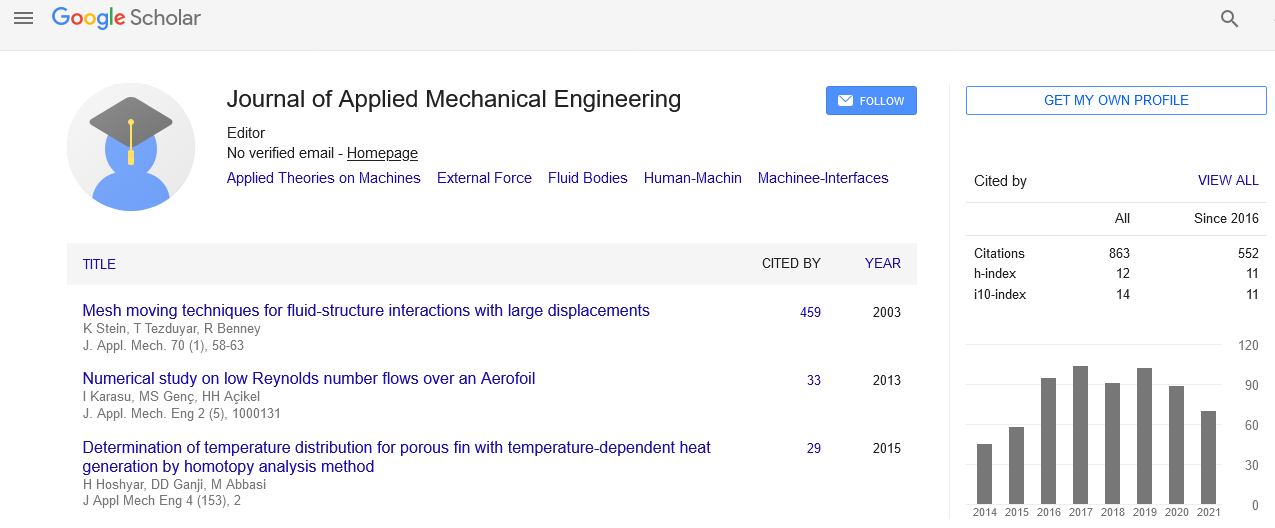Indexed In
- Genamics JournalSeek
- JournalTOCs
- CiteFactor
- RefSeek
- Hamdard University
- EBSCO A-Z
- OCLC- WorldCat
- Publons
- Google Scholar
Useful Links
Share This Page
Journal Flyer

Open Access Journals
- Agri and Aquaculture
- Biochemistry
- Bioinformatics & Systems Biology
- Business & Management
- Chemistry
- Clinical Sciences
- Engineering
- Food & Nutrition
- General Science
- Genetics & Molecular Biology
- Immunology & Microbiology
- Medical Sciences
- Neuroscience & Psychology
- Nursing & Health Care
- Pharmaceutical Sciences
An analytical and experimental investigation of planar flow melts spinning process to manufacture amorphous ribbons
International Conference on Design and Production Engineering
July 25-26, 2016 Berlin,Germany
M Sowjanya
Muffakham Jah College of Engineering and Technology, India
Scientific Tracks Abstracts: J Appl Mech Eng
Abstract:
Amorphous ribbons employed for transformer core applications are manufactured by using planar flow melt spinning process. Molten metal, ejected by inert gas pressure on to a rotating cooling wheel through a constricted nozzle slit, accumulates as a puddle between the nozzle-wheel gaps. A thin layer of melt is dragged in the form of a ribbon from the under cooled puddle. Critical process parameters are nozzle-slit width, wheel speed, nozzle-wheel gap, melt ejection pressure and temperature. The physical dimensions and metallurgical characteristics of the ribbon obtained depend highly on the fluid flow in the puddle and the heat transfer rate between the melt and the cooling wheel. High cooling rates and process speeds involved restrict the scope of experimental investigation of the above mentioned phenomena. Hence, numerical models are developed to predict the ribbon thickness, quality and heat dissipation in the cooling wheel. The results are supported by experimental investigation and found to be well in agreement. It is observed that the thickness and width of the ribbon is highly influenced by the wheel speed and nozzle-slit width. Amorphous structure is observed to be influenced by the heat transfer rate to the cooling wheel. Even though higher wheel speeds provide higher cooling rates at the melt-wheel contact, heat dissipation from the wheel to the cooling medium also observed to play an important role in obtaining a non-crystalline ribbon. It is suggested to use nozzles with larger slit width and spinning at higher wheel speeds to obtain thinner and wider ribbons.
Biography :
M Sowjanya obtained her PhD (Mechanical Engineering) from Jawaharlal Nehru Technological University Hyderabad, India for her research in Planar Flow Melt Spinning Process. She has 12 years of teaching experience and presently working as Associate Professor. She has 10 papers to her credit and received ‘Excellent Paper Award' in International conference in Manufacturing and Optimization (ICMO) 2013, conducted by IACSIT at New Delhi, India. Her primary research areas of interest are Planar Flow Melt Spinning Process and heat transfer simulation and analysis of liquid/gas quenching of metals. She has also received 'Best Paper' award for her paper presented in International conference on Technological Innovations in Mechanical Engineering (TIME 2016), Hyderabad.
Email: madireddisowjanya@gmail.com

